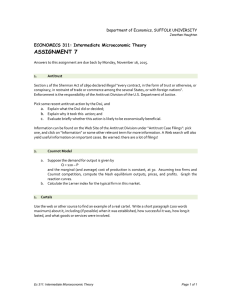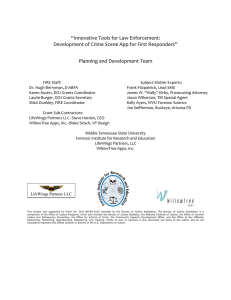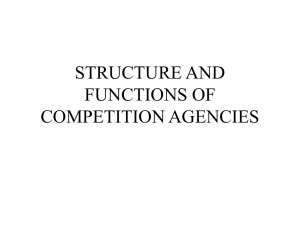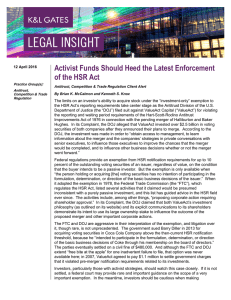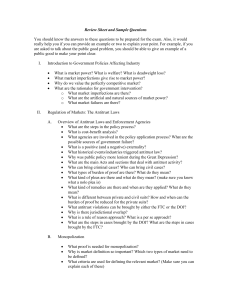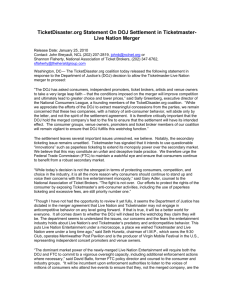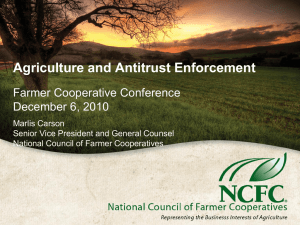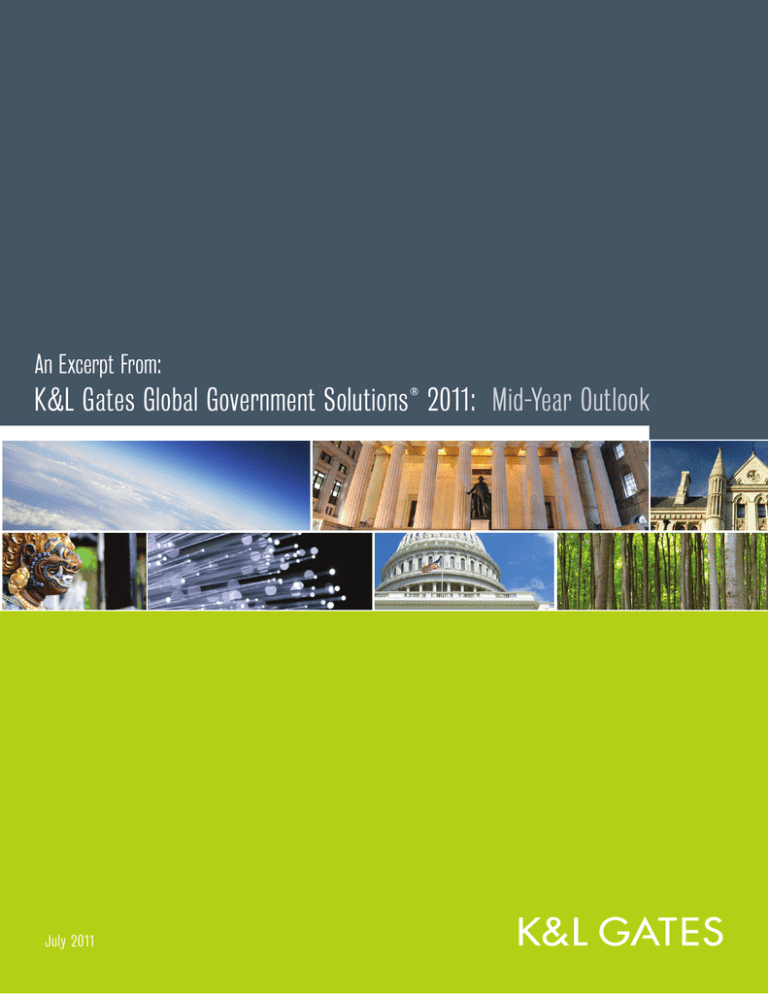
An Excerpt From:
K&L Gates Global Government Solutions ® 2011: Mid-Year Outlook
July 2011
Antitrust and Competition
Agencies Continue Aggressive Antitrust Enforcement in the Health Care Industry
The Obama administration has expressed the view that lack of competition
contributes to high health care costs. Federal agencies are thus continuing
their aggressive pursuit of players in the health care industry. The U.S. Justice
Department’s Antitrust Division (“DOJ”) is continuing to vigorously prosecute its
claim against Blue Cross/Blue Shield of Michigan based on alleged exclusionary
conduct directed at rival insurers. Specifically, DOJ alleges that Blue Cross agreed
to pay higher fees to those hospitals that agree to charge higher fees to competing
insurance companies. DOJ recently announced that it is also investigating Blue
Cross/Blue Shield in a half dozen other states.
The Blue Cross cases are focused on
competition in the health insurance
business. Another recent DOJ case is
focused on competition in the hospital
business. Earlier this year, DOJ brought
a monopolization case against United
Regional Health Care System, the
largest hospital system in the Wichita
Falls, Texas area, claiming that United
Regional incentivized insurers to stop
dealing with its competitors. The
contracts at issue allegedly required
insurers to pay United Regional
significantly higher prices if they
contracted with a nearby competing
facility. In a proposed settlement, which
has not yet been finalized, United
Regional would be unable to enter into
these types of arrangements for seven
years.
In keeping with the focus on competition
in the health care industry, the Federal
Trade Commission (“FTC”) challenged
ProMedica Health System, Inc.’s
consummated acquisition of St. Luke’s
Hospital, a rival hospital in Ohio. A
federal judge issued a preliminary
injunction preserving competition between
ProMedica and St. Luke’s pending a full
administrative trial on the merits.
Despite some high-profile losses, the FTC
also continues to aggressively litigate
“reverse settlement” cases, involving
alleged payments from a branded
pharmaceutical company to the generic
maker in return for the latter’s agreement
40
K&L Gates Global Government Solutions ® 2011 Mid-Year Outlook
to delay market entry. A recent report
from the agency found that deals
delaying the introduction of cheaper
generic drugs had increased from 19 in
2009, to 31 in 2010.
Proposed Guidelines for
Accountable Care Organizations
Stir Public Debate
The new health care law authorizes
the formation of Accountable Care
Organizations (“ACOs”) to reduce costs
and improve the quality of care through
clinical integration. In March, the FTC
and the DOJ issued antitrust guidelines
on ACOs, entitled “Proposed Statement
of Antitrust Enforcement Policy Regarding
Accountable Care Organizations
Participating in the Medicare Shared
Savings Program.” The Proposed
Statement establishes a rule-of-reason
analysis for qualifying ACOs, provides a
safe harbor for ACOs that meet certain
thresholds, and requires mandatory
review for others. The public comment
period for the Proposed Statement closed
on May 31.
Public comments on the Proposed
Statement were generally positive
about the establishment of rule-of-reason
treatment for ACOs. However, they
expressed concerns about the Proposed
Statement’s use of primary service areas
(“PSAs”) to calculate the market share
of an ACO participant in a particular
service area. Commenters were
Antitrust and Competition
DOJ alleges that Blue Cross agreed
to pay higher fees to those hospitals
that agree to charge higher fees to
competing insurance companies.
concerned about the utility of PSAs as
a measure and the resources needed to
calculate market shares. The agencies
may revise the Proposed Statement based
on public comment, but given the present
focus on antitrust issues in the health care
industry, it is likely that mandatory review,
and some calculation of market share,
will remain a part of the review process.
DOJ Stepping Up the Challenge to
Non-Criminal Conduct
Under the Bush administration, the DOJ
placed most of its non-merger focus on
criminal conduct—so-called “hard-core”
antitrust violations like price-fixing and
bid-rigging. The agency did not bring
a single monopolization case under
Section 2 of the Sherman Act. But
soon after taking office under President
Obama, Assistant Attorney General
Christine Varney rejected the previous
administration’s narrow approach to
monopolization cases. The DOJ’s cases
against United Regional, Blue Cross,
and American Express in the last several
months confirm that DOJ is no longer
focused exclusively on cartels. With the
DOJ vocally committed to a more active
enforcement strategy, we should expect
to see more of these cases in the future.
Agencies Target
Consummated Deals
A transaction that is not reportable
under the Hart-Scott-Rodino Antitrust
Improvements Act of 1976 (“HSR”) is
not necessarily unassailable. Recent
cases demonstrate a continued—perhaps
even heightened—commitment by the
agencies to challenge smaller, nonreportable deals, including those that
have already closed. DOJ has also
targeted non-reportable transactions.
Enforcement Activity Remains
Strong in Agriculture
DOJ continued to focus on transactions
in the agriculture industry, bringing new
suits and settling others. Dean Foods
agreed to divest assets acquired from
Foremost Farms USA Cooperative to settle
an antitrust suit launched by the DOJ.
Although the deal was too small to be
reportable under the HSR rules, the suit
alleged that the transaction effectively
eliminated a key rival to Dean Foods,
and injured competition in the sale of
milk to schools and retailers in Illinois,
Michigan, and Wisconsin. DOJ’s suit
also illustrates DOJ’s agriculture agenda,
as does its long investigation of the
proposed acquisition by a large food
company of Coleman Natural Foods.
Kenneth L. Glazer (Washington, D.C.)
ken.glazer@klgates.com
Catherine A. LaRose (Washington, D.C.)
catherine.larose@klgates.com
One case is also interesting because the
acquisition is alleged to damage sellers,
rather than consumers. The acquisition
allegedly eliminates significant competition
between two of the only three major
companies that purchase the services of
chicken growers in the Shenandoah Valley
area. The new Merger Guidelines included
a section on monopsony (buyer-side market
power) for the first time, so this case may
demonstrate a new agency focus on harm
to market participants other than consumers
and other downstream market participants.
K&L Gates Global Government Solutions ® 2011 Mid-Year Outlook
41
Anchorage Austin Beijing Berlin Boston Brussels Charlotte Chicago Dallas Doha Dubai Fort Worth Frankfurt Harrisburg Hong Kong
London Los Angeles Miami Moscow Newark New York Orange County Palo Alto Paris Pittsburgh Portland Raleigh Research Triangle Park
San Diego San Francisco Seattle Shanghai Singapore Spokane/Coeur d’Alene Taipei Tokyo Warsaw Washington, D.C.
K&L Gates includes lawyers practicing out of 38 offices located in North America, Europe, Asia and the Middle
East, and represents numerous GLOBAL 500, FORTUNE 100, and FTSE 100 corporations, in addition to growth
and middle market companies, entrepreneurs, capital market participants and public sector entities. For more
information about K&L Gates or its locations and registrations, visit www.klgates.com.
This publication is for informational purposes and does not contain or convey legal advice. The information herein should not be used or relied upon in regard to
any particular facts or circumstances without first consulting a lawyer.
©2011 K&L Gates LLP. All Rights Reserved.

